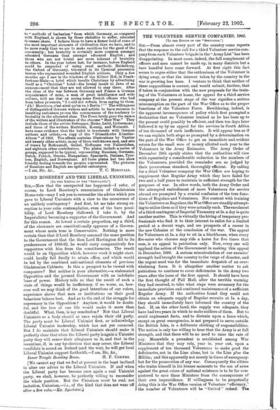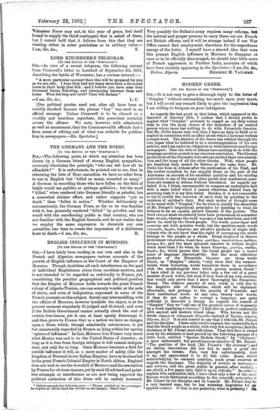THE VOLUNTEER SERVICE COMPANIES, 1902.
rTo TIM EDITOR OF THE "SPECTATOE."_1 Sra,—From almost every part of the country come reports that the response to the call for a third Volunteer service com- pany from each Volunteer brigade in the "Army List" has been disappointing. In most cases, indeed, the full complement of officers and men cannot be made up, in many districts but a bare handful have come forward. At first sight this fact seems to argue either that the enthusiasm of the Volunteer is dying away, or that the interest taken by the country in the war is growing less keen. I venture to think that neither of these suppositions is correct, and would submit, further, that if taken in conjunction with the new proposals for the train- ing of the Volunteers at home, the appeal for a third service company at the present stage of the war signifies a serious misconception on the part of the War Office as to the proper functions of the Volunteer Force. Bewildering, indeed, is the apparent inconsequence of policy which first prompted a declaration that no Volunteer trained as he has been up to the present could possibly be efficient, and then ten days later followed it up by an appeal for the services in South Africa of ten thousand of such inefficients. It will appear less so if we can explain both steps as prompted by a determination on the part of the War Office to get an immediate and evident return for the small sum of money allotted each year to the Volunteers in the Army Estimates. The Army Order of December 24th openly states that the authorities will view with equanimity a considerable reduction in the numbers of the Volunteers, provided the remainder are, as judged by their procrustean standard, thoroughly efficient. By calling for a third Volunteer company the War Office are hoping to supplement that Regular Army which they have failed for two and a half years to maintain in sufficient strength for the purposes of war. In other words, both the Army Order and the attempted embodiment of more Volunteers for service abroad are prompted by a crucial confusion of the true func- tions of Regulars and Volunteers. Not content with training the Volunteers as Regulars, the War Office are steadily attempt- ing to utilise them as if they were actually such. The enrolment of a third contingent of Imperial Yeomanry at 5s. a day is quite another matter. This is virtually the hiring of temporary pro- fessionals who find it to their interest to enlist for a limited period at a decent wage, and see prospects of a career in the new Colonies at the conclusion of the war. The appeal for Volunteers at is. a day to sit in a blockhouse, when every fire-eater who chooses may ride a horse for five times that sum, is an appeal to patriotism only. Now, every one will applaud the action of the Government in making this appeal in December, 1899. A serious miscalculation of our enemies' strength had brought the country to the verge of disaster, and the urgent need was for the immediate despatch of an over- whelming force. It is altogether another matter to ask patriotism to continue to cover deficiencies in the Army two years after the issue of the first appeaL It should have been the first thought of Pall Mall, after the terrible warning they had received, to take what steps were necessary for the immediate provision and continued maintenance of a sufficient Regular Army. If the authorities found they could not obtain an adequate supply of Regular recruits at is. a day, they should immediately have informed the country of the fact. If, on the other hand, the supply was adequate, they have had two years in which to make soldiers of them. But to avoid unpleasant facts, and to distrain upon a force which, except on great emergencies, is not prepared to serve outside the British Isles, is a deliberate shirking of responsibilities. The nation is only too willing to hear that the Army is at full strength, and that there will be no need to raise the rate of pay. Meanwhile a precedent is established among War Ministers that they may rely, year in, year out, upon a supplement of ten thousand Volunteers to make good the deficiencies, not in the Line alone, but in the Line plus the Militia; and this apparently not merely in times of emergency. but for the prosecution of any war. Consequently the citizen who trains himself in his leisure moments to the use of arms against the great crises of national existence is to be for over pestered to save these Ministers from the consequences of their own improvidence. If willingness to be perpetually doing this is the War Office version of Volunteer "efficiency,- the number of Volunteers will be "limited" indeed. The Volunteer Force may not, in this year of grace, feel itself bound to supply the third contingent that is asked of them, but I cannot hold that it follows from this that they are Wanting either in sober patriotism or in military value.—











































 Previous page
Previous page